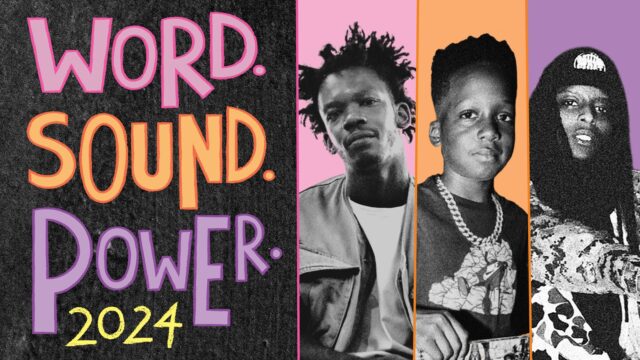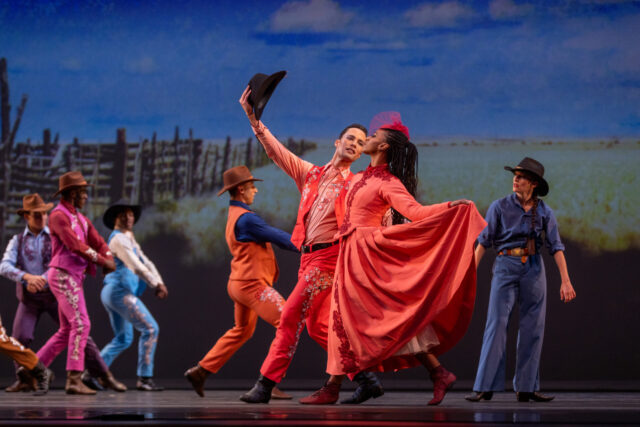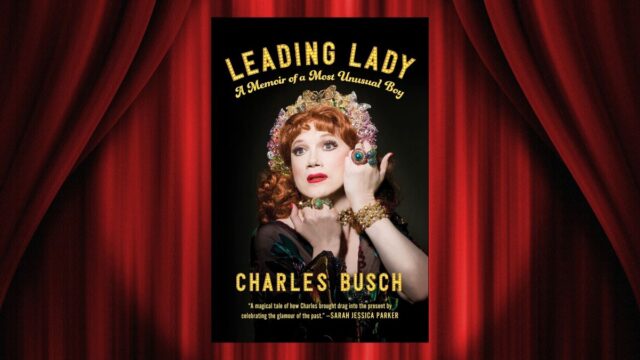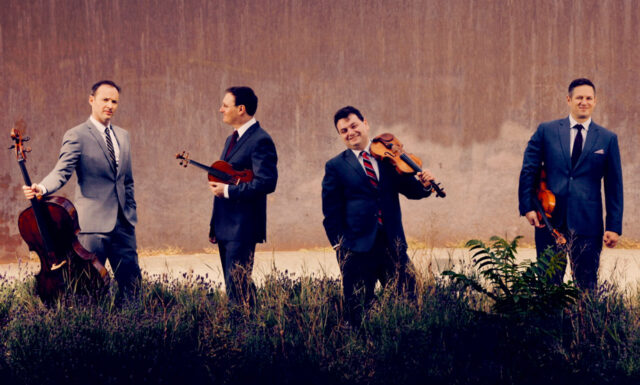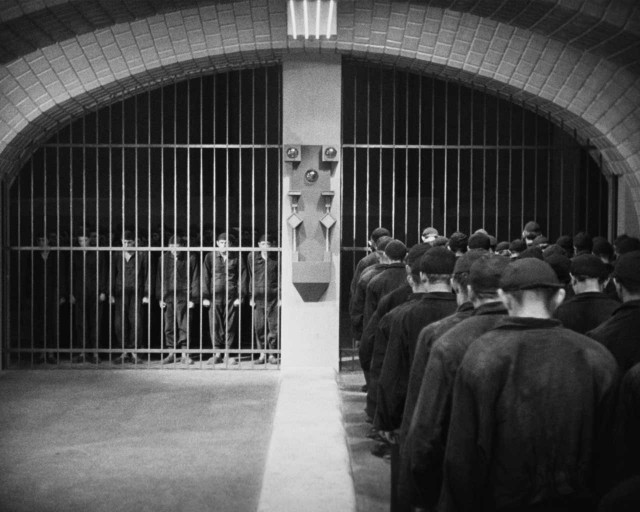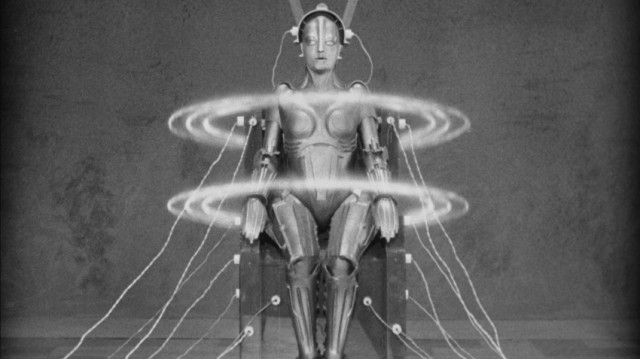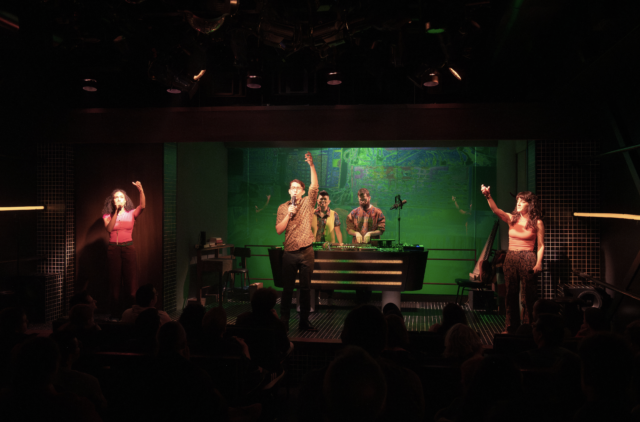
James Harrison Monaco’s Travels keeps sharing stories at Ars Nova through April 20 (photo by Ben Arons)
TRAVELS
Ars Nova
511 West 54th St. between Tenth & Eleventh Aves.
Tuesday – Sunday through April 20, name your price (suggested $25-$35)
212-352-3101
arsnovanyc.com
James Harrison Monaco takes audiences on a poignant and entertaining audiovisual journey in Travels, continuing at Ars Nova through April 20. The ninety-minute show, which Monaco calls “a sonic narrative collection,” is an intimate multimedia trip comprising eight tales that venture from Southern California, Cairo, Zurich, Brazil, and the Dominican Republic to Switzerland, Turkey, Iran, Mexico, and Bay Ridge.
“All of the stories we are about to tell you tonight, to a certain extent the people who first told me these stories have given me permission to tell versions of them now to you,” Monaco explains early on. “I’m not sure I’m the best person to be telling these stories, but I also know I love these stories deeply. And I’ve invited some of my favorite storytellers and musicians to help me understand and tell these stories.”
Each anecdote is related in the first person by Monaco, Ashley De La Rosa, El Beh, or Mehry Eslaminia — or a combination of them — spoken in dialogue or sung. Multi-instrumentalist John Murchison accompanies them on the bass, oud, or qanun. When Monaco, De La Rosa, El Beh, and Eslaminia are not sharing a yarn, they contribute heavy beats and dance loops on electronics (there are several laptops on a central table) or manipulate live images shown on a small wall to the left.
Meanwhile, abstract shapes and recognizable forms are projected on a rear screen and spill out above the stage, and chasing lights in LED tubes shoot across the sides of the theater in emotionally tinged colors. (The music and lights are already pulsating as the crowd enters, as if preparing for a rave.) The music supervision is by Or Matias, with set design by Diggle, appealing costumes by Sarita Fellows, lighting by Jeanette Oi-Suk Yew, sound by Nick Kourtides, and projections by Stefania Bulbarella.
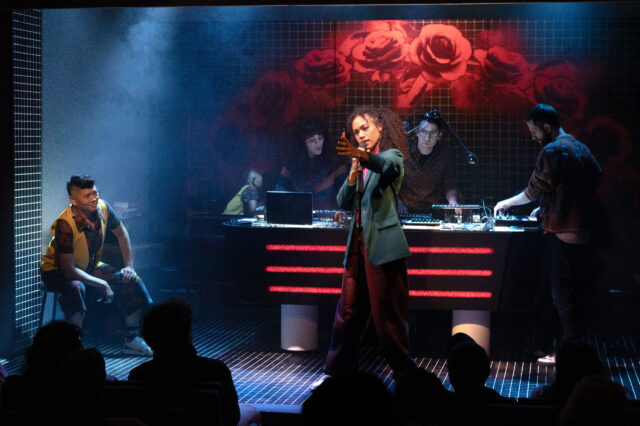
Ashley De La Rosa is one of four storytellers and a musician in James Harrison Monaco’s Travels (photo by Ben Arons)
The first story, “Sa’eed,” is about a chemist from a porcelain factory in Cairo who is now a Lyft driver in Southern California. They bond over tiles. Monaco gushes, “Now, you need to understand that I fucking love porcelain more than any other material on this earth – I made a whole other full length show about this [Paulownia], so I won’t talk too much about it here, but we started talking passionately about this magical form of ceramic.” Thus, the floor and walls of Diggle’s set are made of black tile squares.
Monaco, who is also a professional translator, occasionally speaks in different languages as he intersperses elements from his personal life, often involving romantic breakups. We learn about the complicated relationship between landscaper/school bus driver Thomas, Gerhard, and Leopoldo. He investigates the strange cabaret visa in Switzerland primarily affecting strippers and men coming from outside the EU seeking pleasure. He visits Guanajuato, Mexico, where he encounters Aurora and Sofia, bar-hopping teachers who introduce him to narcocorrido music as they discuss food poisoning, the phases of love, and the mystery of life.
Half of the show is about Monaco’s friend known simply as R. They meet at a dinner party on the Upper West Side, where they bond over literature. A journalist, R’s adventures include prison, seeking asylum, and Persian translations of Proust’s In Search of Lost Time and Dante’s Divine Comedy.
Travels is about the stories we tell, who gets to tell them, and how we tell them. It doesn’t matter how true they in fact might be, since in many cases it’s Monaco, or one of his three surrogates, relating a story that was told to him by strangers who, through storytelling, seemingly become friends. The show is affectionately directed by Andrew Scoville in a way that makes us all feel like friends by the end — after which we will go out and tell stories about Travels, perhaps recommending it to other friends.
El Beh (Bark of Millions), De La Rosa (Mean Girls, Beautiful: The Carole King Musical), Eslaminia (1776), and Monaco (The Conversationalists) are warm and engaging, making connections with the crowd, especially when they venture into the audience, who are seated either in swivel chairs or, up front, on large, comfortable couches. Murchison (Natasha, Pierre & the Great Comet of 1812; Oratorio for Living Things) is a wizard with his numerous instruments.
At one point Monaco notes upon a surprising revelation from R, “I recall holding eye contact with him in this moment. It would be rude of me to ask directly more of this story; it wasn’t my business — his story clearly involved a lot of pain. You could see that in his eyes. And yet, there was something in our eye contact, where he was aware that there was a great story he could tell. I couldn’t ask about it directly; that would be rude.” But soon R is off and running, beginning, “This is an interesting story. . . .”
During the Mexican teachers tale, Aurora asks Monaco, “All right, who are you? What’s your story?” and then states, “Everybody travels.”
Using travel as the thread, Monaco tells us his story while making us consider our own.
[Mark Rifkin is a Brooklyn-born, Manhattan-based writer and editor; you can follow him on Substack here.]
